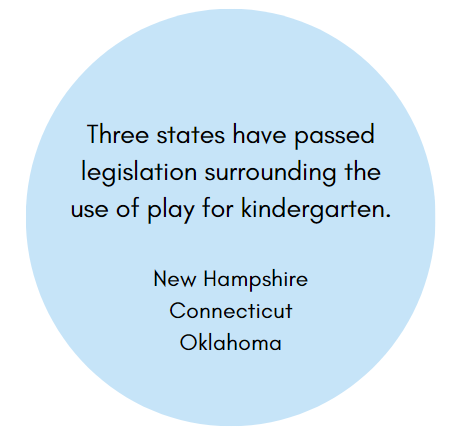Posted on April 8, 2024

By Olivia Carrara Leontine Young Fellow
Footnotes:
-
Tracking the winds of change on the American education policy landscape: The emergence of play-based learning legislation and its implications for the classroom ↵
-
ibid ↵
-
ibid ↵
-
Play-Based Learning: Evidence-Based Research to Improve Children’s Learning Experiences in the Kindergarten Classroom ↵
-
Prioritizing Play: The Importance of Play-based Learning in Early Education↵
-
Can guidance during play enhance children’s learning and development in educational contexts? A systematic review and meta-analysis↵
-
State Laws Requiring Play-Based Learning↵
-
ibid ↵
-
ibid ↵
-
ibid ↵
-
ibid ↵
-
ibid ↵

There has been a recent movement in promoting the use of play-based learning (PBL) beyond the preschool setting. While most preschools and child care centers operate using PBL models, many K-12 schools have shifted their focus to strictly academic learning. In recent decades, the rigor of kindergarten instruction has intensified, with a typical school day consisting of textbooks and worksheets, with just one short recess. This intense commitment to school readiness is often referred to as “schoolification” and leads teachers to focus on math and literacy skills, rather than developmentally appropriate learning.1 For many young learners, developmentally appropriate learning includes a focus on play, socializing, creativity, and collaboration–all components crucial for social and emotional development.2 Not only does this type of learning facilitate social and relational growth, but it also leads to positive academic outcomes and increased language abilities.3 Policymakers are beginning to recognize the importance of play.
Play, in an academic setting, can be either free or guided. While both free and guided play can be beneficial to children, PBL focuses primarily on the use of guided learning. In guided play, early learners are encouraged to make their own choices, direct their own play, and explore their surroundings, all while an educator stands by to facilitate learning.4 The educator can help guide play by asking questions, promoting conversation, and offering ideas for expanding play–all of these can nurture learning. Guided learning can also be used in the form of games. Educators can utilize games to teach their lessons and actively involve their students in the learning process.5 While some individuals argue that direct teaching is more effective than guided play, research has shown that PBL can have positive impacts on executive functioning, social skills, and math literacy, all of which are crucial to a child’s academic progress.6
In an effort to promote the use of PBL, three states have passed legislation surrounding the use of play for kindergarten. New Hampshire was the first state to pass legislation requiring the use of PBL in kindergarten as of 2018.7 In 2023, Connecticut passed legislation mandating PBL in pre-K and public kindergarten, beginning in July 2024.8 Oklahoma, on the other hand, did not pass legislation requiring the use of PBL, but it did prohibit schools from restricting the use of PBL in early childhood education. This law passed in 2021.9

While each of these laws assists in the promotion of PBL, a number of barriers are keeping them from being implemented properly. The first barrier is funding.10 PBL requires classrooms to have adequate play areas, toys, and supplies to allow for beneficial play. Without funding, teachers and administrators are unable to provide students with the resources they need. A second obstacle is accountability.11 While these laws mandate PBL or prohibit the restriction of such, they do not have pathways that hold schools accountable. There is nothing in place within these states to ensure that schools are following the requirements in their early grades. The laws also do not establish plans to prepare educators or train them on the use of PBL.12 While some education and professional development programs focus on PBL, educators required to use such techniques should be properly trained in the area. The barriers restricting the implementation of these requirements must be addressed, so that our youngest learners can receive their early education in the most efficient ways possible.
Access the following resources for more information on play-based learning:
Play-Based Learning Definition and Benefits
Quality - What Does a High Quality Kindergarten Program Look Like

